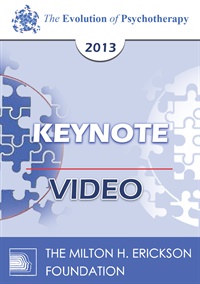Credit available - Click Here for more information
- Average Rating:
- Not yet rated
- Topic Areas:
- Keynotes | Cognitive Behavior Therapy (CBT) | Psychotherapy
- Bundle(s):
- Learning Track - EP17 CBT Stream
- Categories:
- Evolution of Psychotherapy | Evolution of Psychotherapy 2017 | Evolution of Psychotherapy CBT Learning Track | Online Continuing Education
- Faculty:
- Aaron Beck, MD | Judith Beck, PhD
- Course Levels:
- Master Degree or Higher in Health-Related Field
- Duration:
- 56:33
- Format:
- Audio and Video
- Original Program Date:
- Dec 16, 2017
- Short Description:
- According to a recent survey, Cognitive Therapy is now the leading form of psychotherapy throughout the world. Its application to the numerous psychological disorders, as well as medical problems, has been well documented. In recent years, Cognitive Therapy has been successfully applied to the most intractable and chronic disorders, such as severe mental illness. Strategies and techniques in treating schizophrenia will be described.
- Price:
-
Sale is $29.00
price reduced from Base Price - $59.00
- Average Rating:
- Not yet rated
- Topic Areas:
- Keynotes | Psychotherapy | Cognitive Behavior Therapy (CBT) | History of Psychotherapy
- Categories:
- Evolution of Psychotherapy | Evolution of Psychotherapy 2013
- Faculty:
- Aaron Beck, MD
- Course Levels:
- Master Degree or Higher in Health-Related Field
- Duration:
- 1:02:55
- Format:
- Audio and Video
- Original Program Date:
- Dec 15, 2013
- Short Description:
- The discussion will center on the evolution of the cognitive model of psychopathology and psychotherapy since its earlier stage. The expansion of therapy has included all of the common disorders and many of the medically related disorders will be explored. Finally, we will focus on the future of cognitive therapy and psychotherapy in general. Special attention will be paid to the relationship of other psychotherapies.
- Price:
-
Sale is $29.00
price reduced from Base Price - $59.00
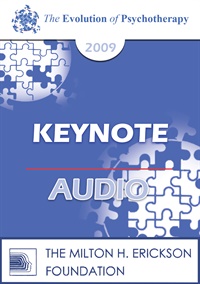
- Average Rating:
- Not yet rated
- Topic Areas:
- Cognitive Behavior Therapy (CBT) | Keynotes | Neuroscience | Psychotherapy
- Categories:
- Evolution of Psychotherapy | Evolution of Psychotherapy 2009
- Faculty:
- Aaron Beck, MD | Judith Beck, PhD
- Duration:
- 57 Minutes
- Format:
- Audio Only
- Original Program Date:
- Dec 10, 2009
- Short Description:
- In this keynote address, the following topics will be covered: the development of cognitive therapy; applications to other psychiatric and medical conditions; the relationship of brain abnormalities to symptoms; the use of neuroimaging and cognitive therapy; and predictions of the future for cognitive therapy, and psychotherapy in general.
- Price:
- $15.00 - Base Price
- Average Rating:
- Not yet rated
- Topic Areas:
- Keynotes | Cognitive Behavior Therapy (CBT) | Psychotherapy | Pain and Healing | Panic
- Categories:
- Evolution of Psychotherapy | Evolution of Psychotherapy 2005
- Faculty:
- Aaron Beck, MD
- Course Levels:
- Master Degree or Higher in Health-Related Field
- Duration:
- 1:04:42
- Format:
- Audio and Video
- Original Program Date:
- Dec 11, 2005
- Short Description:
- Dr. Beck will provide a perspective on the evolution and the place of cognitive therapy today. He will compare standard cognitive therapy to newer developments in theory and therapy such as mindfulness, attention focus, and positive psychology. Dr. Beck also will discuss the role of cognitive approaches to conflict and suffering.
- Price:
-
Sale is $29.00
price reduced from Base Price - $59.00
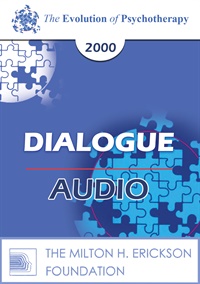
- Average Rating:
- Not yet rated
- Topic Areas:
- Psychotherapy | Dialogues
- Categories:
- Evolution of Psychotherapy | Evolution of Psychotherapy 2000
- Faculty:
- Aaron Beck, MD | Jeffrey Zeig, PhD
- Duration:
- 53 Minutes
- Format:
- Audio Only
- Original Program Date:
- May 27, 2000
- Short Description:
- EP00 Dialogue 03 - Treatment of Severely Disturbed Patients - Aaron Beck, M.D., and Jeffrey Zeig, Ph.D. Given a topic to become aware of the differing approaches to psychotherapy and to identify the strengths and weaknesses in each approach. Moderated by Ruth McClendon
- Price:
- $15.00 - Base Price
Tags: Jeff Zeig Psychotherapy Aaron Beck
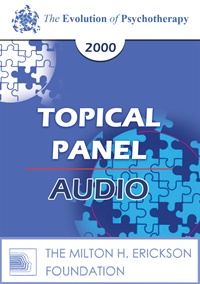
- Average Rating:
- Not yet rated
- Topic Areas:
- Topical Panels | Psychotherapy | Research
- Categories:
- Evolution of Psychotherapy | Evolution of Psychotherapy 2000
- Faculty:
- Albert Bandura | Aaron Beck, MD | Eugene Gendlin, PhD | Donald Meichenbaum, PhD
- Duration:
- 55 Minutes
- Format:
- Audio Only
- Original Program Date:
- May 27, 2000
- Short Description:
- Topical Panel 12 from the Evolution of Psychotherapy 2000 - Research in Psychotherapy Featuring Albert Bandura, PhD, Aaron Beck, MD, Eugene Gendlin, PhD, and Donald Meichenbaum, PhD. Moderated by Camillo Loriedo, MD.
- Price:
- $15.00 - Base Price
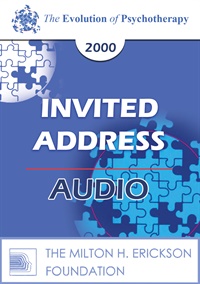
- Average Rating:
- Not yet rated
- Topic Areas:
- Invited Addresses | Cognitive Behavior Therapy (CBT) | Schizophrenia
- Categories:
- Evolution of Psychotherapy | Evolution of Psychotherapy 2000
- Faculty:
- Aaron Beck, MD | Miriam Polster
- Duration:
- 1 Hour 26 Minutes
- Format:
- Audio Only
- Original Program Date:
- May 26, 2000
- Short Description:
- There have been some surprising developments in cognitive approaches to schizophrenia in recent years. Dr. Beck will describe the clinical trials, some of the therapeutic strategies used to modify, if not eliminate, delusions and hallucinations, and a cognitive model for understanding paranoid psychosis. This understanding will enable therapists to add substantially to the improvement provided by medication.
- Price:
- $15.00 - Base Price
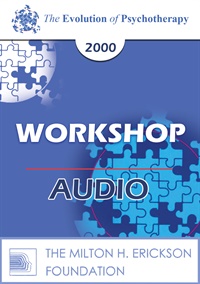
- Average Rating:
- Not yet rated
- Topic Areas:
- Cognitive Behavior Therapy (CBT) | Workshops | Personality Disorders | Psychotherapy
- Categories:
- Evolution of Psychotherapy | Evolution of Psychotherapy 2000
- Faculty:
- Judith Beck, PhD | Aaron Beck, MD
- Duration:
- 2 Hours 40 Minutes
- Format:
- Audio Only
- Original Program Date:
- May 25, 2000
- Short Description:
- Cognitive Therapy has been extended in recent years to the treatment of severe mental disorders, such as bipolar disorders, schizophrenia and anorexia nervosa. This workshop will focus on strategies for relieving problems associated with severe disorders. Participants will be expected to present clinical problems and role-play patients illustrative of the specific problems that they encounter.
- Price:
- $15.00 - Base Price
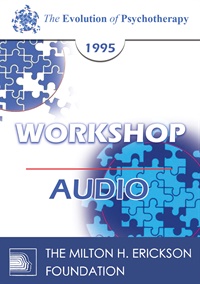
- Average Rating:
- Not yet rated
- Topic Areas:
- Workshops | Cognitive Behavior Therapy (CBT) | Conflict | Couples Therapy | Psychotherapy
- Categories:
- Evolution of Psychotherapy | Evolution of Psychotherapy 1995
- Faculty:
- Aaron Beck, MD | Judith Beck, PhD
- Duration:
- 2 Hours 34 Minutes
- Format:
- Audio Only
- Original Program Date:
- Dec 17, 1995
- Short Description:
- Strategies developed in cognitive therapy of depression are readily applied to couples' problems. Assessment of conflicting perspectives, thinking disorder, escalation of distortions and cognitive interference with communication. Reducing hostility, reinforcing pleasure, increasing collaboration and improving sexual satisfaction through cognitive interventions.
- Price:
- $15.00 - Base Price
- Average Rating:
- Not yet rated
- Topic Areas:
- Clinical Demonstrations | Belief Systems | Cognitive Behavior Therapy (CBT) | Interviewing | Psychotherapy
- Categories:
- Evolution of Psychotherapy | Evolution of Psychotherapy 1995
- Faculty:
- Judith Beck, PhD | Aaron Beck, MD
- Course Levels:
- Master Degree or Higher in Health-Related Field
- Duration:
- 58:21
- Format:
- Audio and Video
- Original Program Date:
- Dec 16, 1995
- Short Description:
- Educational Objectives: To describe socratic questioning. To give examples of three negative automatic thoughts. To give examples of three dysfunctional beliefs.
- Price:
- $59.00 - Base Price
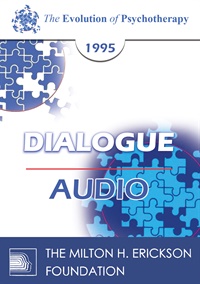
- Average Rating:
- Not yet rated
- Topic Areas:
- Dialogues | Psychotherapy
- Categories:
- Evolution of Psychotherapy | Evolution of Psychotherapy 1995
- Faculty:
- Aaron Beck, MD | Arnold Lazarus, Ph.D.
- Duration:
- 58 Minutes
- Format:
- Audio Only
- Original Program Date:
- Dec 16, 1995
- Short Description:
- Dialogue 09 from the Evolution of Psychotherapy 1995 - Advanced Approaches to Therapy, featuring Aaron Beck, MD; and Arnold Lazarus, PhD.
- Price:
- $15.00 - Base Price
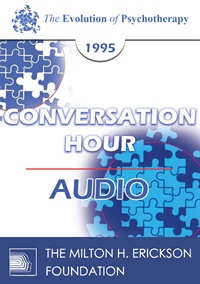
- Average Rating:
- Not yet rated
- Topic Areas:
- Conversation Hours | Psychotherapy
- Categories:
- Evolution of Psychotherapy | Evolution of Psychotherapy 1995
- Faculty:
- Aaron Beck, MD
- Duration:
- 58 Minutes
- Format:
- Audio Only
- Original Program Date:
- Dec 15, 1995
- Short Description:
- Conversation Hour 05 from the Evolution of Psychotherapy 1995- Aaron Beck, MD
- Price:
- $15.00 - Base Price
Tags: Aaron Beck Psychotherapy
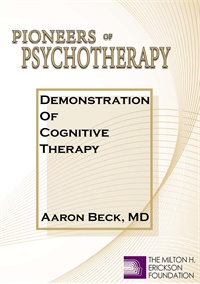
Credit available - Click Here for more information
- Average Rating:
- Not yet rated
- Topic Areas:
- Clinical Demonstrations | Abuse | Addiction | Psychotherapy | Role Play | Cognitive Behavior Therapy (CBT) | Relationships
- Bundle(s):
- Pioneers of Psychotherapy Bundle
- Categories:
- Pioneers of Psychotherapy | Online Continuing Education | Evolution of Psychotherapy | Evolution of Psychotherapy 1995
- Faculty:
- Aaron Beck, MD
- Course Levels:
- Master Degree or Higher in Health-Related Field
- Duration:
- 00:59:00
- Format:
- Audio and Video
- Original Program Date:
- Dec 15, 1995
- Short Description:
- Aaron Beck (1995) selects a clinician to role-play a male client. The client, Mike, was abandoned by his wife after she had multiple affairs. Mike is a recovering alcoholic with a sexually transmitted disease who suffers from dating anxiety, childhood trauma, and feelings of inferiority. Beck demonstrates how to establish a collaborative relationship with the patient.
- Price:
- $59.00 - Base Price
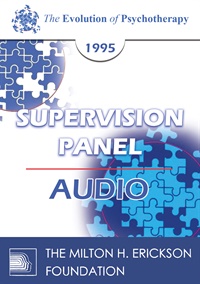
- Average Rating:
- Not yet rated
- Topic Areas:
- Supervision Panels | Supervision | Psychotherapy
- Categories:
- Evolution of Psychotherapy | Evolution of Psychotherapy 1995
- Faculty:
- Aaron Beck, MD | Otto Kernberg, MD | Jeffrey Zeig, PhD
- Course Levels:
- Master Degree or Higher in Health-Related Field
- Duration:
- 55:31
- Format:
- Audio Only
- Original Program Date:
- Dec 15, 1995
- Short Description:
- Supervision Panel 5 from the Evolution of Psychotherapy 1995 - Beck, Kernberg and Zeig Educational Objective: To compare and contrast clinical and philosophical perspectives of experts.
- Price:
- $15.00 - Base Price

- Average Rating:
- Not yet rated
- Topic Areas:
- Invited Addresses | Cognitive Behavior Therapy (CBT) | Psychotherapy | Anxiety | Depression | Panic
- Categories:
- Evolution of Psychotherapy | Evolution of Psychotherapy 1995 | Pioneers in Couples and Family Therapy
- Faculty:
- Aaron Beck, MD | Salvador Minuchin, MD
- Duration:
- 1 Hour 31 Minutes
- Format:
- Audio Only
- Original Program Date:
- Dec 14, 1995
- Short Description:
- Cognitive therapy was originally developed for the treatment of Depression and Anxiety. Since its early beginnings various clinicians and investigators have extended its use to a wide variety of disorders and populations. Systematic outcome studies have demonstrated its efficacy not only in the garden variety of disorders such as Depression, Anxiety and Panic but also in medical disorders such a low back pain, diabetes, chronic fatigue syndrome and chronic hypertension.
- Price:
- $15.00 - Base Price
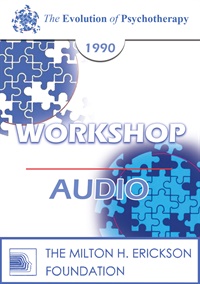
- Average Rating:
- Not yet rated
- Topic Areas:
- Workshops | Cognitive Behavior Therapy (CBT) | Personality Disorders | Psychotherapy
- Categories:
- Evolution of Psychotherapy | Evolution of Psychotherapy 1990
- Faculty:
- Aaron Beck, MD | Christine Padesky, PhD
- Duration:
- 2 Hours 29 Minutes
- Format:
- Audio Only
- Original Program Date:
- Dec 14, 1990
- Short Description:
- This workshop will address how to elicit and systematically change core beliefs (schemas) with Axis II patients. Topics include the constructive use of transference reactions as a therapeutic tool, and the management of hostility and excessive dependency. The use of imagery and role playing, and the applications of childhood material will be reviewed. A cognitive conceptualization of a case will be given. Ways to handle problems such as missed sessions, prolonging sessions, avoidance, and homework noncompliance will be addressed.
- Price:
- $15.00 - Base Price
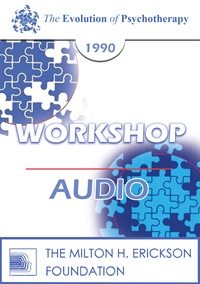
- Average Rating:
- Not yet rated
- Topic Areas:
- Workshops | Cognitive Behavior Therapy (CBT) | Depression | Psychotherapy
- Categories:
- Evolution of Psychotherapy | Evolution of Psychotherapy 1990
- Faculty:
- Aaron Beck, MD | Christine Padesky, PhD
- Duration:
- 2 Hours 41 Minutes
- Format:
- Audio Only
- Original Program Date:
- Dec 13, 1990
- Short Description:
- Strategies developed in cognitive therapy of depression are readily applied to couples' problems: Assessment includes ascertaining conflicting perspectives, thinking disorder, escalation of distortions, and cognitive interference with communication. Interventions include reducing hostility, reinforcing pleasure, increasing collaboration) and improving sexual satisfaction through cognitive interventions. Prerequisite reading: Love is Never Enough (Harper & Row).
- Price:
- $15.00 - Base Price
- Average Rating:
- Not yet rated
- Topic Areas:
- Invited Addresses | Cognitive Behavior Therapy (CBT) | Psychotherapy
- Categories:
- Evolution of Psychotherapy | Evolution of Psychotherapy 1985
- Faculty:
- Aaron Beck, MD | Stowe Hausner, PhD
- Course Levels:
- Master Degree or Higher in Health-Related Field
- Duration:
- 1:23:41
- Format:
- Audio and Video
- Original Program Date:
- Dec 15, 1985
- Short Description:
- Invited Address Session 13 - Part 2 - A Dialogue on Cognitive Therapy with Beck and Hausner featuring Aaron T Beck, PhD. With co-faculty Stowe Hausner, PhD. Moderated by Aaron H Canter, PhD.
- Price:
-
Sale is $29.00
price reduced from Base Price - $59.00
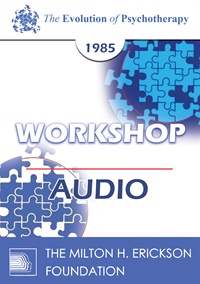
- Average Rating:
- Not yet rated
- Topic Areas:
- Workshops | Cognitive Behavior Therapy (CBT) | Depression | Psychotherapy
- Categories:
- Evolution of Psychotherapy | Evolution of Psychotherapy 1985
- Faculty:
- Aaron Beck, MD | Stowe Hausner, PhD
- Duration:
- 2 Hours 45 Minutes
- Format:
- Audio Only
- Original Program Date:
- Dec 14, 1985
- Short Description:
- An information processing model designed to clarify the biased and constricted thinking in depression will be described. The practical applications of the model use principles of guided discovery and collaborative empiricism. There will be a demonstration of specific strategies applied to dysfunctional cognitions and beliefs. A blending of cognitive and behavioral techniques are used for in vivo exercises.
- Price:
- $15.00 - Base Price
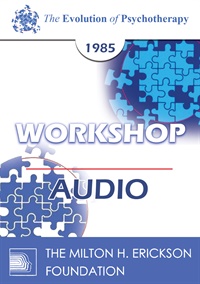
- Average Rating:
- Not yet rated
- Topic Areas:
- Workshops | Anxiety | Cognitive Behavior Therapy (CBT) | Panic | Psychotherapy | Phobia
- Categories:
- Evolution of Psychotherapy | Evolution of Psychotherapy 1985
- Faculty:
- Aaron Beck, MD | Stowe Hausner, PhD
- Duration:
- 2 Hours 52 Minutes
- Format:
- Audio Only
- Original Program Date:
- Dec 12, 1985
- Short Description:
- The Cognitive Model of anxiety as applied to acute and chronic anxiety, post-traumatic disorders, agoraphobias, panic disorders and simple phobias will be presented. Cognitive-behavioral strategies include identification and evaulation of dysfunctional cognition, induced imagery, induced panic attacks, and cognitive monitoring of exposure treatment. A videotaped demonstration of the treatment of panic disorders will be shown.
- Price:
- $15.00 - Base Price
- Average Rating:
- Not yet rated
- Topic Areas:
- Topical Panels | Psychotherapy | Research
- Categories:
- Evolution of Psychotherapy | Evolution of Psychotherapy 1985
- Faculty:
- Aaron Beck, MD | James Bugental, PhD | Ernest Rossi, PhD | Joseph Wolpe, M.D.
- Course Levels:
- Master Degree or Higher in Health-Related Field
- Duration:
- 1:02:15
- Format:
- Audio and Video
- Original Program Date:
- Dec 11, 1985
- Short Description:
- Topical Panel 04 on Psychotherapy Research, featuring Aaron T Beck, MD, James FT Bugental, PhD, Ernest L Rossi, PhD, and Joseph Wolpe, MD. Moderated by Larry E Beutler, PhD.
- Price:
-
Sale is $29.00
price reduced from Base Price - $59.00
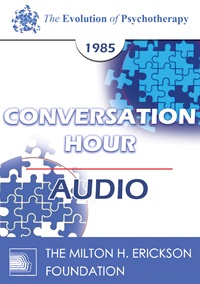
- Average Rating:
- Not yet rated
- Topic Areas:
- Conversation Hours | Psychotherapy
- Categories:
- Evolution of Psychotherapy | Evolution of Psychotherapy 1985
- Faculty:
- Aaron Beck, MD
- Duration:
- 58 Minutes
- Format:
- Audio Only
- Original Program Date:
- Dec 11, 1985
- Short Description:
- Conversation Hour 01 with Aaron Beck, MD.
- Price:
- $15.00 - Base Price
Tags: Aaron Beck Psychotherapy



